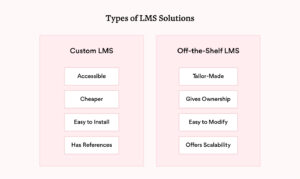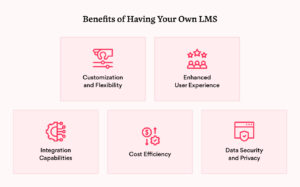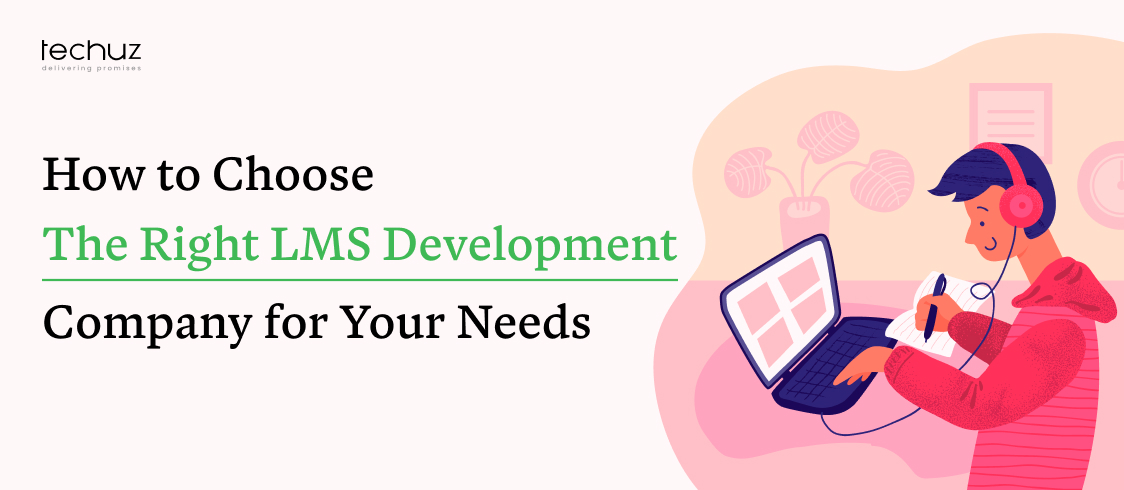Posted on
November 7, 2024
Updated on
November 11, 2024
Read time
 14 mins read
14 mins read
Introduction
In the last decade or so, companies specializing in learning management systems (LMS) have been extremely helpful for businesses, educational institutions, and other organizations which want to make the process of training, learning, and development easier. In relation to training management systems, it is common for organizations to consider either building a new training management system internally or purchasing an off-the-shelf training system. The decision on which LMS service provider to engage especially for a custom solution can be crucial more so in the U.S. where the needs of the businesses are dynamic in nature.
There is an advantage of having a LMS that gives room for enhancements from the service provider for instance embossing a brand of choice and including other features only peculiar to the organization’s training platform. In contrast to generic operational systems, bespoke applications allow for the introduction of intricate activities, distinct instructional strategies, and particular data analysis mechanisms that are not available with conventional systems. Adding the services of an experienced LMS service provider does not only mean that they will help build new applications but they will also help in the integration of new applications such that data transfer and efficiency are enhanced.
Having an LMS made-in-house means that the business can implement the prescribed training in its slow learning process due the introduction of new regulations, enacting new training or expanding with growth of the firm. In such cases, investing in custom LMS solutions becomes a preferable option for businesses that require an LMS service provider who will easily adapt to their ever-changing needs. Given the current scenario where companies in the U.S are engaging in dynamic economic activities this aspect of flexibility is more important.
LMS development company that can provide custom solutions allows enterprises to make use of an LMS system that is specific to their requirements and works in a scalable and flexible manner.
Table of Content
Understanding LMS Solution
A Learning Management System (LMS) is an application or platform that is primarily used for the delivery, tracking, and management of training programs, learning and educational courses and materials. This eases the management of learning processes through a single platform that caters for instructors, learners and even the administrators.
Types of LMS Solutions
There are primarily two types of LMS solutions:
Custom LMS: Designed to meet the extent of needs of a particular business, the industry and any other regulating aspects, such custom suit solutions are created to fit the clients.
Off-the-Shelf LMS: A generic or normal purpose built LMS with fixed features available in the market to buy and use in any industry without alterations.

The Primary Determinants: Custom LMS Solutions and Off the Shelf LMS Applications
It is important to analyze the strengths and weaknesses of a custom learning management system and pre-packages solutions while making any conclusions regarding the two. Below is a comprehensive analysis which further clarifies the reasons as to why custom LMS solutions tend to be preferred amongst many businesses in the USA.
1. Growth Potential
Custom LMS: These solutions are easily scalable up to the needs of the user. As the individual or organization grows, additional features and modules can be integrated into the system. This makes them most suitable for entities that have a growth venture procedurally or are in an explosive change at that time.
Off-the-Shelf LMS: Some of them do, however, allow for scalability. Most of these limitations relate to the functional and user interface customization capabilities. It may take too much resources to scale up the current system for more users/new functions or it may even require changing the system altogether.
2. Versatility
Custom LMS: A custom-made learning management system is accommodating to bespoke business processes, integrates with sister systems and provides different end users with different experiences. It is even possible to construct the platform to comply with certain specific industries or regulatory standards or branding constraints, which is great for companies wanting such enhancements.
Off-the-Shelf LMS: The systems have set characteristics which do not necessarily suit your organization. Any adjustments are possible at a cost; nevertheless, these modifications are often shallow and austere, and major changes are likely to be expensive or theoretically infeasible.
3. Scalability
Custom LMS: Custom LMS solutions are highly elastically scalable. They can grow and evolve along with the organization incorporating extra features and modules whenever needed. This adaptability is why they are best suited to organizations with strategic growth plans or those that are currently growing faster than the rate at which they can design and implement such solutions.
Off-the-Shelf LMS: While some aspects of certain off-the-shelf solutions may be very effective and allow for scalability, there are almost always limitations. For example, the degree to which the system can be customized may be limited, and when the time comes to scale the system in terms of users or incorporate other functions, more costs may be incurred or even need to shift to another system altogether.
4. Flexibility
Custom LMS: A custom made LMS permits personalized process designs, integrates existing systems effectively, and provides unique user experiences. The system can be constructed to fit certain industrial, regulatory, and branding objectives, thus making it ideal for companies looking for special aspects.
Off-the-Shelf LMS: Such systems are often equipped with ready-made functionalities that do not adhere to the needs of your organization. Even though a certain degree of customization may be allowed, this is usually minimal and in depth changes may prove prohibitive in technical capabilities or costs.
5. Financial Aspects
Custom LMS – Although developing a custom learning management system can be an expensive undertaking, the returns usually exceed the upfront cost in the long run. Custom LMS solutions help to mitigate the annoyance of paying subscription costs, eliminate the wastage of costs incurred for features that are not needed, and cut the cost incurred in making changes on ready-made solutions to fit the organization’s requirements.
Off the Shelf LMS- At first, these ready-made solutions seem cheaper since they have lower initial payments. Outgoing rental expenses, payments for extras, and different modifications that may be needed, and quite frankly, may change the way you look at these solutions, often in due course exceeding the price of a tailor made LMS.
6. User-friendliness
Custom LMS –The design of the application and the design can be made depending on the target users making the whole learning experience very easy. Custom dashboards, learning paths, and performance analytics increase motivation and effectiveness of training.
Off The Shelf LMS – Certain commercially available LMS are designed with ease of use in mind, however they are generic platforms which may not adequately fulfill several of your organization’s needs. The available modifications might not work for the interested user class leading to poor user experience.
7. Maintenance and Support
Custom LMS- When dealing with a tailor-made LMS development firm, you are guaranteed constant assistance towards system upgrades, maintenance, and repairs. The development partner can work with you to set particular service level agreements (SLAs), to guarantee enforceable support and ongoing enhancements.
Off-the-shelf LMS- Usually, maintenance and support services are provided by the vendor but the services may not be of the same level. There may be support constraints when there is a need to modify or enhance the system in specific ways.
Benefits of Custom LMS Solution
When you choose a custom LMS development company, you receive dedicated assistance for system upgrades, upkeep, and soundness of operation. You can also reach out to the development partner whenever the need arises and request for even more strict conditions for guarantees of improved support for regular assistance and improvement services – these are called service-level agreements (SLAs).

Specific Business Requirements Customization
A bespoke LMS is built around your organization and its specific needs. This encompasses modification of e-learning materials, custom integration with other corporate solutions (e.g. HR, CRM, ERP etc) , and adjustment of the system to external or internal corporate requirements.
Improved Security Components
One of the primary considerations, given the sensitive nature of data contained in any learning management system (LMS) , especially custom ones, is security. Custom LMS solutions could be built with sophisticated security patterns built in, for instance data encryption, access control mechanisms compliant with the local or global statutory data protection regimes such as GDPR, HIPAA and many others.
Enhanced Functionality for Integration
In other words, it is possible to develop an LMS that can, in essence, integrate well with any existing software applications and tools. Such integration allows for networking between the systems, thereby doing away with unnecessary manual processes, and Coupling data containment, so that information is not stored only in one place.
Audience’s Motivation Enhancement
Custom LMS systems can be gamified, or equipped with personalized learning paths or artificial intelligence for better engagement. Such functions make online learning experiences more lively and entertaining for working people or pupils alike.
Better ROI Over Time
Though the process of developing a custom LMS may ask for a more costly expenditure in the beginning, the ROI in most cases tends to be better in the long run. This is because there are lower subscription costs, less spending on external plugins, and lower expenses for implementation changes.
Custom LMS Solutions: Reasons Why Companies in the USA Should Invest in Them
The economy of the USA is diverse, dynamic and has complex changing compliance issues. A custom LMS is a necessity for businesses operating in this region, for the following reasons:
Adherence to Sectoral Standards
In the US today, most industries like healthcare, financial services, and even manufacturing, are highly regulated. A design for an LMS may be customized to fit the purpose, as it can be incorporated into the training deployment process in a way such that compliance with training related legal requirements is warranted, and breakdown avoided.
Effortless Integration of Learning to the Office Without Constraints
Upon the evolution of remote working and hybrid working models in the USA, there is a growing need for ease to learn solutions. A bespoke LMS can be employed to address different training scenarios, be it training on employees on ground, training from a distance, or a combination of both, to facilitate uninterrupted learning and growth.
Addressing the Unique Needs of Different Industries
Businesses today have different needs across various industries ranging from small technology companies to larger corporations. Features and functionalities that would be lacking in a normal market solution can be incorporated by a custom LMS development company to suit specific industries enabling organizations to achieve their training goals with more ease
Factors to Consider when Choosing a Custom LMS Development Company
It is very important to pick the appropriate LMS designing and development services, as it can make or break your custom LMS development project. Here are a few principles to consider:
Experience and Knowledge
Make sure the development company has successfully completed similar projects of custom LMS development. Such a company should have knowledge on the current technologies in place, knowledge on the industry standards and experience in such projects. Case studies and reference letters will be useful for such a purpose.
Customization Potential
One of the primary advantages offered by custom LMS development agencies is the ability to provide extensive customization. Such capability is the ability to design specific functions, install third-party systems, or modify the LMS to suit any given customer’s needs.
Scalability of the Offering
As your business expands, so will your LMS requirements. Pick a development company that can build the solution with the provision for more users and more features without affecting the already working solution.
Security Protocols
Over the years, sensitive data protection has become one of the main driving factors for the majority of organizations. Therefore, the LMS development company should also possess a strict course of measures relating to the security of the software. For instance there must be secure coding standards, implement a cyber code of ethics, regular security testing and other appropriate measures.
Maintenance and Support Services
After the go-live phase, the importance of ensuring that the system continues to function normally cannot be stressed enough. A company should have support maintenance plans and SLAs providing for the required support and regular system revisions.
Stages of Choosing a Custom LMS Development Firm
State Your Needs
Begin with a detailed description of the educational goals, technical specifications and financial limits of your organization. Such information will assist in the e-learning development company selection process.
Market Research
Investigate possible LMS development firms and analyze their service offerings, skills, and pricing practices. Read reviews, analyze client feedback, and view their past works in order to evaluate companies’ standing in the market.
Call for Action
The next step is to contact some of the companies and in turn, ask them to send their offer for custom-made LMS development in detail. The proposal should contain their specifics regarding timelines, approaches, costs and scope of work for the custom LMS development
Evaluate Proposal and Conduct Interviews
Undertake a thorough analysis of the proposals and perform interviews to assess the effectiveness of the development team and the extent to which they appreciate your needs and work culture.
Certify the Engagement
Upon choosing a vendor, proceed with the edifying process and sign the contract stating clearly the conditions related to production, tailoring, other services provision, and remittances.
Conclusion
There are multiple factors to consider before settling on an LMS Development company that is based on one’s organizational structure goals and resources allocated. With the comparison made between custom LMS and off-the-shelf solutions, it comes out quite strongly that custom LMS solutions provide more scalability in usage and flexibility and more enhancements in the long term especially to the business set up in the USA. When you associate the right development company, you are provided with a solution that is custom to the exact learning needs of your organization and also encourages user interaction and future development.
Custom LMS solutions will also help provide the benefits of well-designed focused learning experiences, seamless system integration, and return on investment which will help boost your organization’s training and development. As much as possible, do not forget to weigh the options available to you, especially with regards to expertise, the ability to scale, and the support services provided, so that you can choose wisely.
FAQ
- How do I choose a good LMS?
Select the best LMS software development company for the best LMS software possible, it is advisable to consider inclusive LMS features, universal learning methods, and simple user interface first. In addition, the software should come with a mobile version for learning purposes, in addition to improved reporting and analysis. Ensure that the platform has enough options for integration, the possibility of scaling up in terms of business, and that the user business information is safely kept and is in conformity with the law.
- Which of the factors must be considered in choosing the LMS?
The selection of an LMS must incorporate the aspects of features, vendor’s perception, costs, and data restrictions. Evaluate the ease of installability, ease of use, interoperability and out of the box compatibility with other systems. Also, the possibilities for customer support and training are very important as well due to the fact that they ease the enter-into use stage for the software.
- How to find the best LMS?
Five important stages to find the best LMS are –
- Stage One: Define the End User.
- Stage Two: Concentrate on Main Characteristics.
- Stage Three: Assess all the LMSs.
- Stage Four: Look Wider the LMS.
- Stage Five: Selection of LMS.








